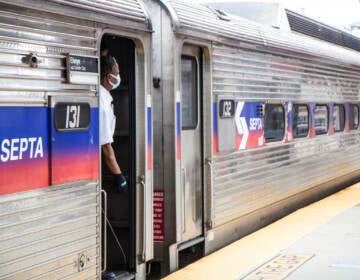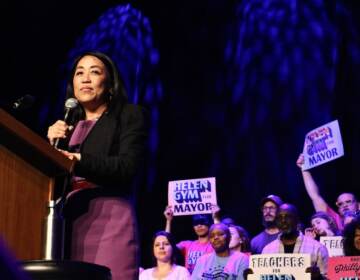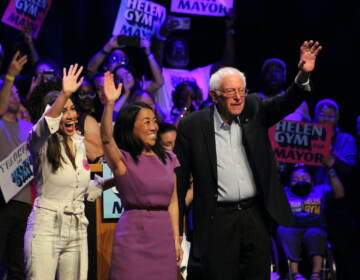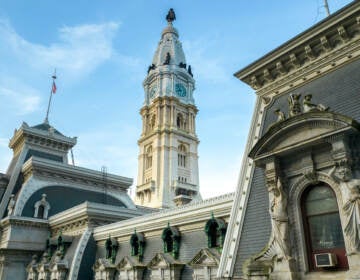Councilmember Gym calls on PPA to pay its fair share to Philly’s schools
The longtime critic of the PPA led the first of a series of investigatory hearings looking into what she called the "financial chaos and questionable expenses of this entity."
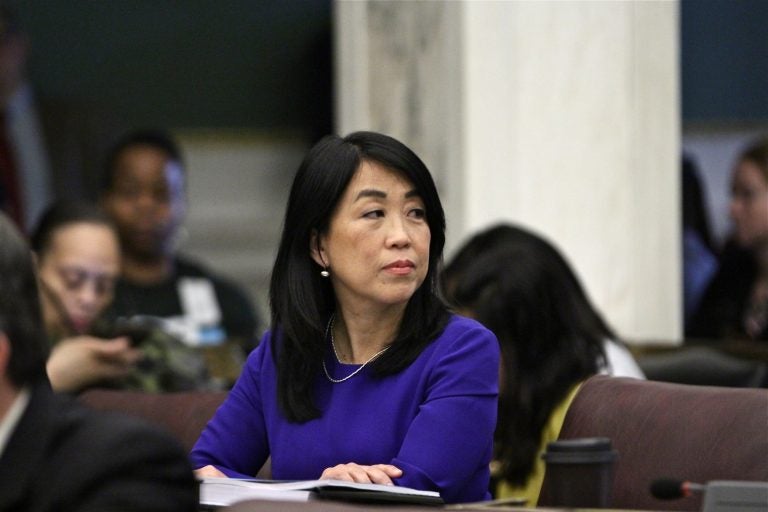
Philadelphia City Councilmember Helen Gym. (Emma Lee/WHYY)
The Philadelphia Parking Authority (PPA) isn’t meeting its obligation to help fund The School District of Philadelphia — instead passing the buck onto the city. That’s what Councilmember Helen Gym claimed at a PPA board meeting early Tuesday, before calling for greater collaboration and transparency surrounding the agency’s finances.
“This is an agency that still is far from its mission,” Gym said. “Every act that we take from here on out, every word that is said, every policy that is passed, every review that is made, and every delay that is issued is effectively a step that reinforces a path in which the public trust has been broken around us, or whether we work together to repair it.”
Last week, Gym — a longtime critic of the PPA — led the first of a series of investigatory City Council hearings looking into what she called the “financial chaos and questionable expenses of this entity.” Among the recent issues that’ve earned the PPA extra scrutiny are its controversial demand that the Philadelphia school district return $11 million paid by the PPA, along with a failed development project that cost the agency at least $1 million.
“The PPA looks forward to working with the City and School District in a spirit of cooperation and partnership,” said PPA spokesperson Martin O’Rourke in an emailed statement following Gym’s comments. He said out of $56 million in net on-street revenue for FY 2020, “the PPA distributed $41.7M to the City and $14.3M to the School District. Since 2004, the PPA has contributed $577 million to the City and $132 million to the School District.”
The PPA’s financials have been a source of frustration for city officials for the last 20 years — ever since Republican lawmakers passed legislation transferring control of the lucrative agency from the city to the state. The proposal included a plan for PPA to pay a certain amount of its on-street parking revenues to the city of Philadelphia and the Philadelphia school district.
But according to Gym, for the most part, that hasn’t happened. She said that a review of the PPA’s financials revealed that for 15 of the past 18 years, the agency’s payments to the school district of Philadelphia were “erratic, often paltry.” That includes last year, when the PPA delivered $0 to the district, as schools struggled to reopen and get students online.
“Stories of revenue diversions away from the public schools and back towards the PPA’s own operations have shocked the senses,” Gym said, “and have gotten worse since 2014, when the PPA lobbied the state to remove formal city oversight over its budget.”
A performance audit released by City Controller Rebecca Rhynhart in 2020 found that the school district may have missed out on as much as $77.9 million because of PPA’s financial mismanagement. Among the report’s findings were that, compared with other large cities including Boston, San Francisco, and Houston, the PPA boasts an inflated workforce, along with some of the highest pay for management-level positions.
Gym said nepotism, secret payouts, building improvement plots, and funding for the PPA’s pension fund were also responsible for siphoning off funds that should have gone to the school district.
“We are given very little — if any, to be honest — no input into financial decisions that could have a large impact on the budget,” Gym said. “And to be clear, every dollar that isn’t funded by the parking authority is likely a dollar that is replaced or given to the school district of Philadelphia from the city of Philadelphia’s own financial coffers. Every single year, our contributions to the school district of Philadelphia have had to grow to meet growing expenses.”
Gym couched her criticism of the PPA in calls for it to work collaboratively with the city — including specific requests that the city be allowed to certify the PPA’s financial statements and budgets, as well as weigh in on financial decisions that will affect the city and school district, and that the PPA provide detailed quarterly financial reports and projections.
She also greeted the PPA’s new board members and acknowledged that they had no responsibility for past missteps — but added that it was their duty to change how the agency operates.
“The diversion of funds that are discretionary,” she said, whether by decision-making or policy, “is at this point systematic. It is willful and is often done secretly. And so I ask the board to partner with the city of Philadelphia and with the school district of Philadelphia again in a spirit of collaboration.”
WHYY is your source for fact-based, in-depth journalism and information. As a nonprofit organization, we rely on financial support from readers like you. Please give today.



